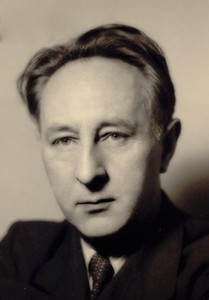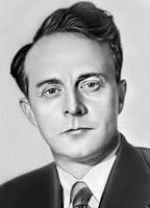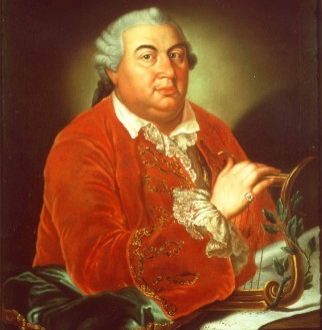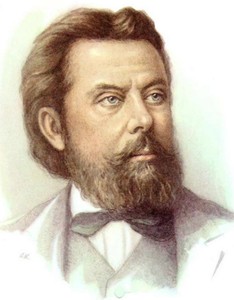
Modest Petrovich Mussorgsky |
Modest Mussorgsky
Life, wherever it affects; true, no matter how salty, a bold, sincere speech to people … – this is my leaven, this is what I want and this is what I would be afraid to miss. From a letter from M. Mussorgsky to V. Stasov dated August 7, 1875
What a vast, rich world of art, if a person is taken as the goal! From a letter from M. Mussorgsky to A. Golenishchev-Kutuzov dated August 17, 1875

Modest Petrovich Mussorgsky is one of the most daring innovators of the XNUMXth century, a brilliant composer who was far ahead of his time and had a huge impact on the development of Russian and European musical art. He lived in an era of the highest spiritual upsurge, profound social changes; it was a time when Russian public life actively contributed to the awakening of national self-consciousness among artists, when works appeared one after another, from which breathed freshness, novelty and, most importantly, amazing real truth and poetry of real Russian life (I. Repin).
Among his contemporaries, Mussorgsky was the most faithful to democratic ideals, uncompromising in serving the truth of life, no matter how salty, and so obsessed with bold ideas that even like-minded friends were often puzzled by the radical nature of his artistic quest and did not always approve of them. Mussorgsky spent his childhood years in a landowner’s estate in an atmosphere of patriarchal peasant life and subsequently wrote in Autobiographical note, what exactly Acquaintance with the spirit of Russian folk life was the main impetus for musical improvisations… And not only improvisations. Brother Filaret later recalled: In adolescence and youth and already in adulthood (Mussorgsky. – O. A.) always treated everything folk and peasant with special love, considered the Russian peasant a real person.
The boy’s musical talent was discovered early. In the seventh year, studying under the guidance of his mother, he already played the simple compositions of F. Liszt on the piano. However, no one in the family seriously thought about his musical future. According to family tradition, in 1849 he was taken to St. Petersburg: first to the Peter and Paul School, then transferred to the School of Guards Ensigns. This was luxurious casemate, where they studied military ballet, and following the infamous circular must obey, and keep reasoning to yourself, knocked out in every possible way foolishness from the headencouraging behind the scenes frivolous pastime. The spiritual maturation of Mussorgsky in this situation was very contradictory. He excelled in military sciences, for which was honored with especially kind attention … by the emperor; was a welcome participant in parties where he played polkas and quadrilles all night long. But at the same time, an inner craving for serious development prompted him to study foreign languages, history, literature, art, take piano lessons from the famous teacher A. Gerke, attend opera performances, despite the displeasure of the military authorities.
In 1856, after graduating from the School, Mussorgsky was enrolled as an officer in the Preobrazhensky Guards Regiment. Before him opened the prospect of a brilliant military career. However, acquaintance in the winter of 1856/57 with A. Dargomyzhsky, Ts. Cui, M. Balakirev opened up other paths, and a gradually ripening spiritual turning point came. The composer himself wrote about it: Rapprochement … with a talented circle of musicians, constant conversations and strong ties with a wide circle of Russian scientists and writers, what Vlad is. Lamansky, Turgenev, Kostomarov, Grigorovich, Kavelin, Pisemsky, Shevchenko and others, especially excited the brain activity of the young composer and gave it a serious strictly scientific direction..
On May 1, 1858, Mussorgsky submitted his resignation. Despite the persuasion of friends and family, he broke with the military service so that nothing would distract him from his musical pursuits. Mussorgsky is overwhelmed terrible, irresistible desire for omniscience. He studies the history of the development of musical art, replays many works by L. Beethoven, R. Schumann, F. Schubert, F. Liszt, G. Berlioz in 4 hands with Balakirev, reads a lot, thinks. All this was accompanied by breakdowns, nervous crises, but in the painful overcoming of doubts, creative forces strengthened, an original artistic individuality was forged, and a worldview position was formed. Mussorgsky is increasingly attracted to the life of the common people. How many fresh sides, untouched by art, are teeming in Russian nature, oh, how many! he writes in one of his letters.
Mussorgsky’s creative activity began stormily. Work went on overwhelmed, each work opened up new horizons, even if it was not brought to the end. So the operas remained unfinished Oedipus rex и Salambo, where for the first time the composer tried to embody the most complex interweaving of the destinies of the people and a strong imperious personality. An unfinished opera played an exceptionally important role for Mussorgsky’s work. Marriage (act 1, 1868), in which, under the influence of Dargomyzhsky’s opera stone guest he used the almost unchanged text of the play by N. Gogol, setting himself the task of musical reproduction human speech in all its subtlest curves. Fascinated by the idea of software, Mussorgsky creates, like his brothers in mighty handful, a number of symphonic works, among which – Night on Bald Mountain (1867). But the most striking artistic discoveries were made in the 60s. in vocal music. Songs appeared, where for the first time in music a gallery of folk types, people humiliated and insulted: Kalistrat, Gopak, Svetik Savishna, Lullaby to Eremushka, Orphan, Picking mushrooms. Mussorgsky’s ability to aptly and accurately recreate living nature in music is amazing (I’ll notice some peoples, and then, on occasion, I’ll emboss), to reproduce a vividly characteristic speech, to give the plot visibility on the stage. And most importantly, the songs are imbued with such a power of compassion for the destitute person that in each of them an ordinary fact rises to the level of a tragic generalization, to a socially accusatory pathos. It’s no coincidence that the song Seminarian was censored!
The pinnacle of Mussorgsky’s work in the 60s. became opera Boris Godunov (on the plot of the drama by A. Pushkin). Mussorgsky began writing it in 1868 and in the summer of 1870 presented the first edition (without the Polish act) to the directorate of the imperial theaters, which rejected the opera, allegedly due to the lack of a female part and the complexity of the recitatives. After revision (one of the results of which was the famous scene near Kromy), in 1873, with the assistance of the singer Yu. Platonova, 3 scenes from the opera were staged, and on February 8, 1874, the entire opera (though with large cuts). The democratically minded public greeted Mussorgsky’s new work with true enthusiasm. However, the further fate of the opera was difficult, because this work most decisively destroyed the usual ideas about the opera performance. Everything here was new: the acutely social idea of the irreconcilability of the interests of the people and the royal power, and the depth of the disclosure of passions and characters, and the psychological complexity of the image of the child-killing king. The musical language turned out to be unusual, about which Mussorgsky himself wrote: By working on the human dialect, I reached the melody created by this dialect, reached the embodiment of recitative in melody.
Опера Boris Godunov – the first example of a folk musical drama, where the Russian people appeared as a force that decisively influences the course of history. At the same time, the people are shown in many ways: the mass, inspired by the same idea, and a gallery of colorful folk characters striking in their life authenticity. The historical plot gave Mussorgsky the opportunity to trace development of the people’s spiritual life, comprehend past in present, to pose many problems – ethical, psychological, social. The composer shows the tragic doom of popular movements and their historical necessity. He came up with a grandiose idea for an opera trilogy dedicated to the fate of the Russian people at critical, turning points in history. While still working on Boris Godunov he hatches an idea Khovanshchina and soon began to collect materials for Pugachev. All this was carried out with the active participation of V. Stasov, who in the 70s. became close to Mussorgsky and was one of the few who truly understood the seriousness of the composer’s creative intentions. I dedicate to you the entire period of my life when the Khovanshchina will be created … you gave it a start, – Mussorgsky wrote to Stasov on July 15, 1872.
Work on Khovanshchina proceeded difficult – Mussorgsky turned to material far beyond the scope of an opera performance. However, he wrote intensively (Work is in full swing!), albeit with long interruptions due to many reasons. At this time, Mussorgsky was having a hard time with the collapse Balakirev circle, cooling of relations with Cui and Rimsky-Korsakov, Balakirev’s departure from musical and social activities. Official service (since 1868, Mussorgsky was an official in the Forest Department of the Ministry of State Property) left only evening and night hours for composing music, and this led to severe overwork and increasingly prolonged depression. However, in spite of everything, the composer’s creative power during this period is striking in its strength and richness of artistic ideas. Along with the tragic Khovanshchina since 1875 Mussorgsky has been working on a comic opera Sorochinsky Fair (according to Gogol). This is good as a saving of creative forcesMussorgsky wrote. — Two pudoviks: “Boris” and “Khovanshchina” nearby can crush… In the summer of 1874, he created one of the outstanding works of piano literature – the cycle Pictures from the exhibitiondedicated to Stasov, to whom Mussorgsky was infinitely grateful for his participation and support: No one hotter than you warmed me in all respects … no one showed me the path more clearly…
The idea is to write a cycle Pictures from the exhibition arose under the impression of a posthumous exhibition of works by the artist V. Hartmann in February 1874. He was a close friend of Mussorgsky, and his sudden death deeply shocked the composer. The work proceeded rapidly, intensively: Sounds and thoughts hung in the air, I swallow and overeat, barely managing to scratch on paper. And in parallel, 3 vocal cycles appear one after another: nursery (1872, on own poems), Without the sun (1874) and Songs and dances of death (1875-77 – both at A. Golenishchev-Kutuzov station). They become the result of the entire chamber-vocal creativity of the composer.
Seriously ill, severely suffering from want, loneliness, and non-recognition, Mussorgsky stubbornly insists that will fight to the last drop of blood. Shortly before his death, in the summer of 1879, together with the singer D. Leonova, he made a big concert trip to the south of Russia and Ukraine, performed the music of Glinka, kuchkists, Schubert, Chopin, Liszt, Schumann, excerpts from his opera Sorochinsky Fair and writes significant words: Life is calling for a new musical work, a broad musical work… to new shores while boundless art!
Fate decreed otherwise. Mussorgsky’s health deteriorated sharply. In February 1881 there was a stroke. Mussorgsky was placed in the Nikolaevsky military land hospital, where he died without having time to complete Khovanshchina и Sorochyn fair.
The entire archive of the composer after his death came to Rimsky-Korsakov. He finished Khovanshchina, carried out a new edition Boris Godunov and achieved their production on the imperial opera stage. It seems to me that my name is even Modest Petrovich, and not Nikolai AndreevichRimsky-Korsakov wrote to his friend. Sorochyn fair completed by A. Lyadov.
The fate of the composer is dramatic, the fate of his creative heritage is difficult, but the glory of Mussorgsky is immortal, for music was for him both a feeling and a thought about the dearly beloved Russian people – a song about him… (B. Asafiev).
O. Averyanova
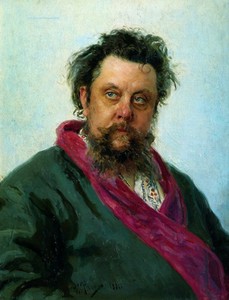
Landlord’s son. Having begun a military career, he continues to study music in St. Petersburg, the first lessons of which he received back in Karevo, and becomes an excellent pianist and a good singer. Communicates with Dargomyzhsky and Balakirev; retired in 1858; the liberation of the peasants in 1861 is reflected in his financial well-being. In 1863, while serving in the Forest Department, he became a member of the Mighty Handful. In 1868, he entered the service of the Ministry of the Interior, after spending three years on his brother’s estate in Minkino for the sake of improving his health. Between 1869 and 1874 he worked on various editions of Boris Godunov. Having undermined his already poor health due to a painful addiction to alcohol, he composes intermittently. Lives with various friends, in 1874 – with Count Golenishchev-Kutuzov (author of poems set by Mussorgsky to music, for example, in the cycle “Songs and Dances of Death”). In 1879 he made a very successful tour together with the singer Daria Leonova.
The years when the idea of ”Boris Godunov” appeared and when this opera was created are fundamental for Russian culture. At this time, such writers as Dostoevsky and Tolstoy worked, and younger ones, like Chekhov, the Wanderers asserted the priority of content over form in their realistic art, which embodied the poverty of the people, the drunkenness of priests, and the brutality of the police. Vereshchagin created truthful pictures dedicated to the Russo-Japanese War, and in The Apotheosis of War he dedicated a pyramid of skulls to all the conquerors of the past, present and future; the great portrait painter Repin also turned to landscape and historical painting. As far as music is concerned, the most characteristic phenomenon at this time was the “Mighty Handful”, which aimed to increase the importance of the national school, using folk legends to create a romanticized picture of the past. In Mussorgsky’s mind, the national school appeared as something ancient, truly archaic, motionless, including eternal folk values, almost sacred things that could be found in the Orthodox religion, in folk choral singing, and finally, in the language that still retains the powerful sonority of distant sources. Here are some of his thoughts, expressed between 1872 and 1880 in letters to Stasov: “It’s not the first time to pick black earth, but you want to pick not for fertilized, but for raw materials, not to get acquainted with the people, but thirst for fraternization … Chernozem power will manifest itself when until the very you will pick the bottoms … “; “The artistic depiction of one beauty, in its material meaning, rude childishness is the childish age of art. The finest features of nature human and human masses, annoying picking in these little-known countries and conquering them – this is the real vocation of the artist. The vocation of the composer constantly prompted his highly sensitive, rebellious soul to strive for the new, for discoveries, which led to a continuous alternation of creative ups and downs, which were associated with interruptions in activity or its spreading in too many directions. “To such an extent I become strict with myself,” writes Mussorgsky to Stasov, “speculatively, and the stricter I become, the more dissolute I become. <...> There is no mood for small things; however, the composition of small plays is a rest when thinking about large creatures. And for me, thinking about large creatures becomes a vacation … so everything goes into a somersault for me – sheer debauchery.
In addition to two major operas, Mussorgsky began and completed other works for the theater, not to mention the magnificent lyrical cycles (a beautiful embodiment of colloquial speech) and the famous innovative Pictures at an Exhibition, which also testify to his great talent as a pianist. A very bold harmonizer, the author of brilliant imitations of folk songs, both solo and choral, gifted with an extraordinary sense of stage music, consistently introducing the idea of a theater that is far from conventional entertainment schemes, from plots dear to European melodrama (mainly love), the composer gave a historical genre, vitality, sculptural clarity, burning fieryness and such depth and visionary clarity that any hint of rhetoric completely disappears and only images of universal significance remain. No one, like him, cultivated exclusively national, Russian epic in the musical theater to the point of refusing any open imitation of the West. But in the depths of the pan-Slavic language, he managed to find consonance with the sufferings and joys of every person, which he expressed with perfect and always modern means.
G. Marchesi (translated by E. Greceanii)



